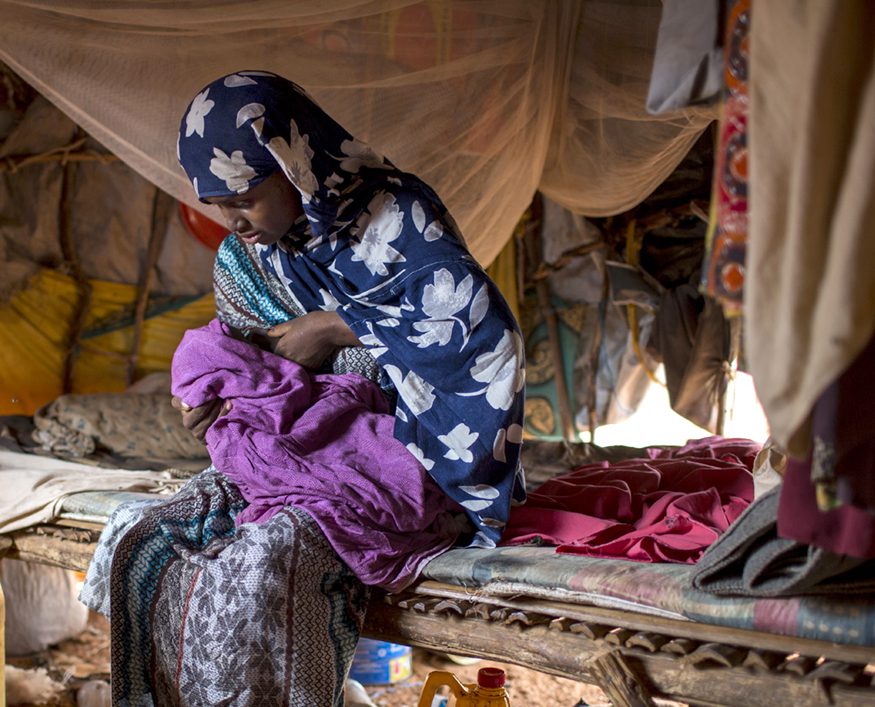By Abiola Afolayan
The 7th State of Global Nutrition report (GNR) was released in December 2021. Bread for the World emphasizes good nutrition for all as essential to a world without hunger. Poor nutrition is, in fact, the leading contributing factor to the global burden of disease and premature death.
Bread and many other organizations and governments have focused much more on early childhood nutrition since 2008. That year, the U.K. medical journal The Lancet published a groundbreaking research series, establishing definitively that there is a critical window for human nutrition and that this window is from pregnancy to age 2. It is often called the “1,000 Days.” Good nutrition during this window can lay the foundation for a lifetime of good health, but malnutrition for even some of the 1,000 Days can cause death or irreversible damage.
Malnutrition is the leading cause of preventable child deaths. Despite decades of progress, the death toll remains unconscionably high: more than 3 million children younger than 5 every year. Those who survive are at very high risk of developing stunting, a condition that causes lifelong damage to physical and cognitive development and health. An estimated 149.2 million of the world’s children under 5 are affected by stunting,
The world is not on track to meet five of the six nutrition targets for maternal, infant, and young child nutrition that were adopted by the World Health Assembly with a deadline of 2025. Among the targets most in need of financial investment are childhood stunting and childhood wasting (also known as acute malnutrition).
The better news is that research and experience have shown straightforward, cost-effective ways of preventing chronic malnutrition during the 1,000 Days. To reduce malnutrition, the global community and local and national governments need to mobilize the political will to invest more in high-impact nutrition programs.
As Bread for the World has previously written, Nourish the Future is a well-researched proposal to the Biden administration on how the United States can effectively reduce global malnutrition. Bread for the World is one of 20 organizations focused on hunger and poverty that have endorsed the initiative. Nourish the Future has the potential to prevent the deaths of 2 million children and improve the livelihoods of 500 million women and their children in nine Nourish the Future “focus countries.”
It is only in the past few years that the anti-hunger movement has widely recognized the necessity of focusing on food systems, which are sometimes called simply “farm to fork” since they encompass growing food, eating food, and all the steps in between, such as transportation.
The Global Nutrition Report emphasizes that the world cannot afford not to invest in nutrition. The financial consequences of poor diets stem largely from increased healthcare costs and decreased economic productivity. Indicating that these global costs will reach $16 trillion a year by 2050, the report emphasizes the need for both public and private financing.
Both food systems and public/private financing are included in the Nourish the Future approach. Nourish the Future recommends scaling up actions that have proven to be effective in supporting the “farm to fork” value chain, producing safer and more nutritious foods with less loss. It also recommends supporting market driven and private sector solutions to global malnutrition, including large scale food fortification initiatives.
This year’s edition of the Global Nutrition Report presents comprehensive data in a concise format that establishes a baseline for data on progress. In the past, it was difficult to measure progress toward the commitments countries made, but a new Nutrition Accountability Framework creates the world’s first independent and comprehensive platform to register nutrition commitments and monitor nutrition action.
The framework has been endorsed by the government of Japan as host of the 2021 Nutrition for Growth Summit, the SUN Movement, the World Health Organization, UNICEF, the U.S. Agency for International Development (USAID), and many other co-convenors of Nutrition for Growth.
Despite the difficult global economic context and the many specific challenges pinpointed in the Global Nutrition Report, its conclusion is reassuring: it is possible both to end malnutrition, and to accomplish this in ways that are healthy for the planet. In fact, “We have never been better equipped with the evidence and tools we need to improve accountability and drive better nutrition outcomes.”
With strong political leadership and investment, the United States has the opportunity to lead the way in doing so. Our country can dramatically reduce global malnutrition and save innumerable human lives.
Abiola Afolayan is senior international policy advisor with Bread for World.



